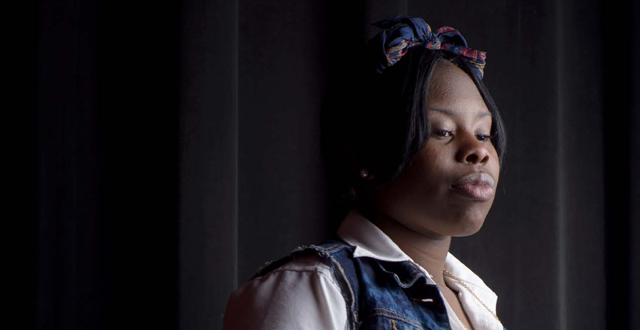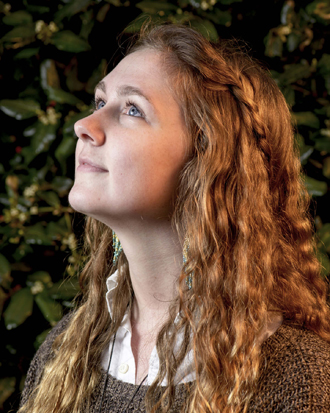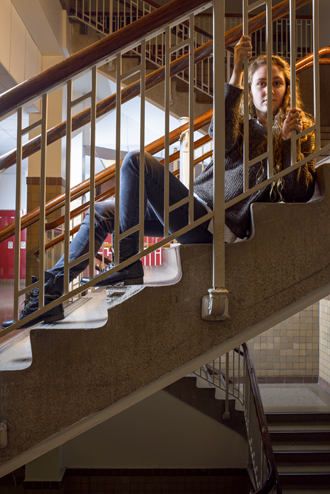Throughout May, commencement speakers everywhere beseech young graduates to embrace opportunity as they step into a bright future. Each graduate has a story about his or her journey to this day. Some have traversed dark and challenging terrain …
For those, the light is especially brilliant.
If the School of Hard Knocks were a real place, Woodrow senior Rogelio Martinez could write the textbook. Nothing about the 20-year-old’s upbringing was easy, but as a sophomore in high school, Martinez found something at Woodrow that changed everything for him — Lisa Moya King’s dance class.
Martinez and his siblings lived with his grandparents in East Dallas for the first half of his life. His mom skipped out on them when Martinez was a baby, and his alcoholic father was deported to Mexico when Martinez was about 7, he says. The year his dad was deported was the first year Martinez failed a grade, but it wasn’t the last.
When he was about 12 or 13, his grandparents moved to Mexico, and he and his twin brother and older sister moved in with their oldest sister and her family. His sister’s husband was anything but welcoming. Martinez says his brother-in-law abused him verbally and physically and threatened to hurt his family if he told anyone about it. That year Martinez failed another grade.
At that point his mom began reaching out to him and his siblings. One day she showed up at the door and took him and his brother away to a small ranch in North Texas outside of Paris, he recalls, but because of her ever-present drinking problem, things weren’t much better.
“I was over there because of what happened, but I never wanted to be there. I just wanted to be here because my whole family was here,” he says. “We were there because we were stuck there.”
When his oldest sister visited them and saw how they were living, she brought Martinez back to Dallas, he says. That year Martinez started going to Woodrow as a freshman.
“The situation when I was living with her was the same, but I didn’t care. I was like, as long as I’m back I don’t care,” he explains. “I always kept an eye on my brother-in-law. I just tried to avoid him.”
The next year, during his sophomore year, Martinez discovered Lisa Moya King’s dance class at Woodrow.
“I started staying after school to practice, and I liked it a lot because I wasn’t at home. I was away from home, I was here doing something that caught my attention, I would forget about everything,” he explains.
Not only did he enjoy it, he excelled at it. Dance opened up a new world to him, and before long he was doing things he never knew were possible.
“I danced everything, and I was a really fast learner. I put all my mind into it,” he says. “People always see me as a quiet person, and when I would dance I would be different. I just love performing, just the way it feels. It’s like freedom, you know?”
But when his brother-in-law found out he was dancing, Martinez says things became worse. He says there were days he couldn’t dance because he was hurt too badly, but he refused to give it up.
Over the years, King became a huge part of his life, he says.
“I saw her as a mom, because I never really had one,” he says. “She took care of me and stuff. A lot of my life I felt like a bother, because of my brother-in-law and because of how other people treated me, but when I was with her, she would talk to me about ‘how’s this and that?’ and she would be after me with my classes, you know, basically like a mom.”
Martinez’ feelings about dance are not uncommon, King says. In her eyes, her dancers are one giant family, and she’s the second mom to them all. “They just take care of each other and keep each other accountable,” she says.
In the four years that King has taught at Woodrow, the Woodrow dance program has grown to be the largest in DISD, and it has been a life-changer for many kids, King says.
“What happens with the students is they come to dance at Woodrow with a very narrow definition of what dance is,” she says. “The transformation happens when they realize that dance is about expression; it’s about individuality.
“So what it does, is it starts this process of self-discovery. They start confronting their fears, they start trying new things, and I think what happens is that transformation carries onto trying anything in life, getting that self-confidence of, ‘You know what, I can do this. I wonder what else I can do in life?’
So it just broadened their horizons, and before you know it they’re going, ‘You know what, I can go to college. I am capable. I can do something with my life.’ And not only that, but it’s through dance that they start developing really strong work ethic. They know that they have to work hard if they want to do well, and then they start doing well in the rest of their classes.”
For Martinez, dance was the reason to go to school, he says. One day his sister told him she was going to take him to live with his mom, but Martinez didn’t want to leave Woodrow. He called King to tell her goodbye, and she and her husband convinced him that, because he was old enough to live on his own, he had a choice. “That same night, I took a backpack, and I just left,” he said.
Now Martinez is 20 years old and a senior. He still dances whatever he can whenever he can, he says. Dance gave him the motivation to go to school and the confidence to do well at it. Now he’s counting down the days until high school graduation. After that, he plans to go on to either college or the Army.
“Because of my family,” he explains. “I saw them and learned from their mistakes, and because I want to do something. I want to prove my brother-in-law wrong, that I am able to do something.”
Anger once fueled Lacresha Weaver, but a mentor helped her turn negative energy into academic success.
When Lacresha Weaver first started going to Woodrow, she didn’t exactly go looking for trouble, but when trouble came looking for her, she didn’t hesitate to oblige.
“When I first got here as a freshman, I was just a little wild,” she says. “I used to fight. My freshman and sophomore year, I fought all the time. I just didn’t take no drama.”
Weaver’s mom transferred her to Woodrow after she jumped into a fistfight at Skyline High School to help her cousin and got hurt, she says. But even after she started going to Woodrow with her brother, she’d scrap with other students if someone messed with her or her siblings.
At first, school wasn’t a top priority. She says she’d often be loitering in the hallway instead of going to class. Although she somewhat managed to keep her grades up during basketball season, her attendance record was a mess.
That was when she met Alene Mathis, or “Mama Mathis” as many at Woodrow know her.
While Weaver was out in the hallways during class time, she’d sometimes be in front of Mathis’ office where Mathis works as the advisor for the credit recovery program, helping students avoid dropping out of high school.
When Weaver stuck her head in Mathis’ office one day, Mathis’ first impression was that she was a “loudmouthed nosey girl,” but she figured Weaver probably just needed a little attention. Mathis fussed at her for always being in the hallway, and then she pulled up Weaver’s grades and found what she expected. She told Weaver she had messed up her grades her freshman year, but she told her she could help her get them back on track, if Weaver wanted.
Weaver agreed and Mathis became a mentor for her – both academically and personally. Mathis reminded Weaver of her grandmother who raised her until she passed away when Weaver was 13. Mathis, who has kids and grandkids of her own, says she became more of a mother or grandmother to Weaver than a teacher.
“Inside she has an old soul,” Mathis says. “She’s a teenager, but she has an old soul. She has knowledge. It’s not just a street smarts, it’s a sense of understanding of what life is. It’s like she gets it.”
Sophomore year Weaver started going to class a little more, but Mathis says she made more of an attitude improvement than an academic one. “It didn’t just happen overnight,” Mathis explains.
Finally, at the end of her sophomore year, something clicked. For starters, Weaver was sent to truancy court for missing so many classes. That’s when she realized her grandmother had raised her better than that and that she would be disappointed if she knew, Weaver says. But more than that, Weaver realized she wanted to succeed in school and in life.
“It was like, ‘Ok, I see all my friends making it. They’ve got all their credits. It’s time for me to get it together. I don’t want to be left here,’” she explains.
“You can’t do anything these days without a high school diploma. Any job you apply for, that’s the first thing they ask.”
Mathis noticed a marked change in Weaver. She started going to class all the time, and she stopped fighting. Mathis mentored her through the summer reconnect program at Woodrow and helped her get her grades back where they needed to be.
“She’s one of the ones that I’m going to really miss,” Mathis says. “She’s one of the students that, if I had to trust a student with confidential information, she’d be the one I’d trust. She’s just really amazing, just seeing where she is from where she was, it’s like watching a miracle unfold.”
Now, as a senior, Weaver feels like she’s a different person today than she was her freshman year.
“This year, I’m very mature. There’s stuff I did I would never do now. I realized that fighting really doesn’t solve anything. I’m the type now that if I get into it with somebody, I’d rather talk about it because I realize it really isn’t worth it.”
At 18, she has a job at Tom Thumb on Mockingbird. After graduation, she plans to go to El Centro in Dallas to begin her college career studying dental hygiene. After that, maybe she’ll go to a university, she says.
“I never would have thought I would be graduating on time this year, but I put my mind to it, and I did the work. I went through a lot to get here, but I finally made it,” she says. “Some people may not have believed me, but you have to believe in yourself.”
Breanna Simpson needed a place to put down roots. Once she found it at Woodrow, she began to flourish emotionally and academically.
Woodrow senior Breanna Simpson possesses the ease of thought and well-spoken confidence people twice her age envy. Her teachers describe her as “well rounded,” “smart,” “sweet” and “down to earth.” Her hair falls in waves around her handmade earrings, and at least half a dozen rings embellish her fingers. Like many young women her age, grappling to find the balance between girlhood and womanhood, she’s quick to smile and just as quick to shed tears. She freely admits she had it better than many kids, but she also has the self-awareness to know she has deep emotional scars that impact who she is and who she will become.
Simpson came to Woodrow Wilson High School after the start of the school year her junior year, which made it difficult for her to get connected in student activities, but that was nothing new for her. Her parents got divorced when she was in 6th grade, and between 7th grade and 10th grade she went to at least six different schools.
“I went through a lot of years being depressed, not having any friends,” she says as her eyes fill with tears.
After the divorce, she lived with her dad so she and her older brother could stay together. He’s a good parent, she says, but they moved around a lot so her brother could play on the best possible baseball teams. Many of the schools were also great schools academically, but being the artistic free-spirit that she is, it was often difficult for Simpson to get connected in some of the more affluent neighborhoods.
While at Flower Mound High School, she felt starkly different from the other students and was very unhappy, she says. It was all she could take, so she decided to move in with her mom, which brought her to Woodrow.
“Best decision I’ve ever made,” she says. “I’m so happy I moved here. My life has completely turned around.”
But leaving her dad’s house was also the hardest decision she’s ever made because it hurt him and caused tension between them, she says, although she doesn’t regret it.
“I never really realized it when it was happening, but looking back I was extremely depressed from 7th to 10th grade,” she explains. “I know I’m not the only one who this has happened to, but I’m so lucky I was able to change and get away from what was making me feel bad.”
When Simpson first came to Woodrow, says her dance teacher, Lisa Moya King, she seemed lost. “She was very reserved, and she wouldn’t go out of her bubble,” King explains.
She’s a smart girl, and good at almost anything she tries, King says. Simpson had been dancing ballet since she was seven and is a gifted dancer.
“She asked if she could be a part of the Woodrow ensemble, which is Woodrow Dance Theater, and even when she got in there, she was still so hesitant to try anything new. She was still trying to acclimate to her environment,” King says.
King began to push Simpson out of her comfort zone, forcing her to break away from strictly ballet into modern dance for the first time.
“She’d have moments of just complete meltdowns because she was having to go out of her comfort zone. She was having to go upside down and be lifted for the first time, and having to lift someone herself,” King explains.
“It was a sense of trust. She did not have any trust. She did not trust anybody to pick her up, and she didn’t trust herself to pick anybody up.”
Simpson describes it as hitting an emotional wall while dancing. She says it started when she was younger, while taking jazz and ballet classes.
“We’d learn something new, and if I couldn’t do it, I’d cry,” she recalls. “I cried so often, almost every class at one point — just being a perfectionist and trying to accomplish what was put in front of us. It’s not that I couldn’t do it, I just gave up…. Or I felt like I was giving up. I just didn’t have the confidence to believe that I was going to get it, eventually.”
King helped her break away from that mindset, she says.
“She’s just really taught me a lot about movement, that it doesn’t have to be perfect and uniform like ballet. You can really get funky with it.
“I just had this mental block. I just didn’t have the confidence to keep going, and that’s not just with dance, that’s with everything. Coming here has really opened my eyes and broadened my spectrum.”
At the same time she began opening up in dance, she also began flourishing socially and academically at Woodrow.
“I have friends now at Woodrow, and I’m doing better than ever in school. I was always confident with my academic skills, I just wasn’t challenging myself before,” she says.
She reached the top 10 percent this year and hopes to graduate with a 3.75 GPA, she says. Once she graduates, she’d like to go to college at Texas A&M for her undergraduate, and then on to Auburn University in Alabama for graduate school for veterinary medicine, which is where her mom, who owns her own vet clinic in Mesquite, went to school.
“The thing about Breanna is, she kind of represents a lot of our kids, staring at future, at life, going, ‘Where do I go? What do I do?’” says King. “She’s discovered she’s good at just about anything she does, so long as she has a work ethic. The world is hers, really.”










